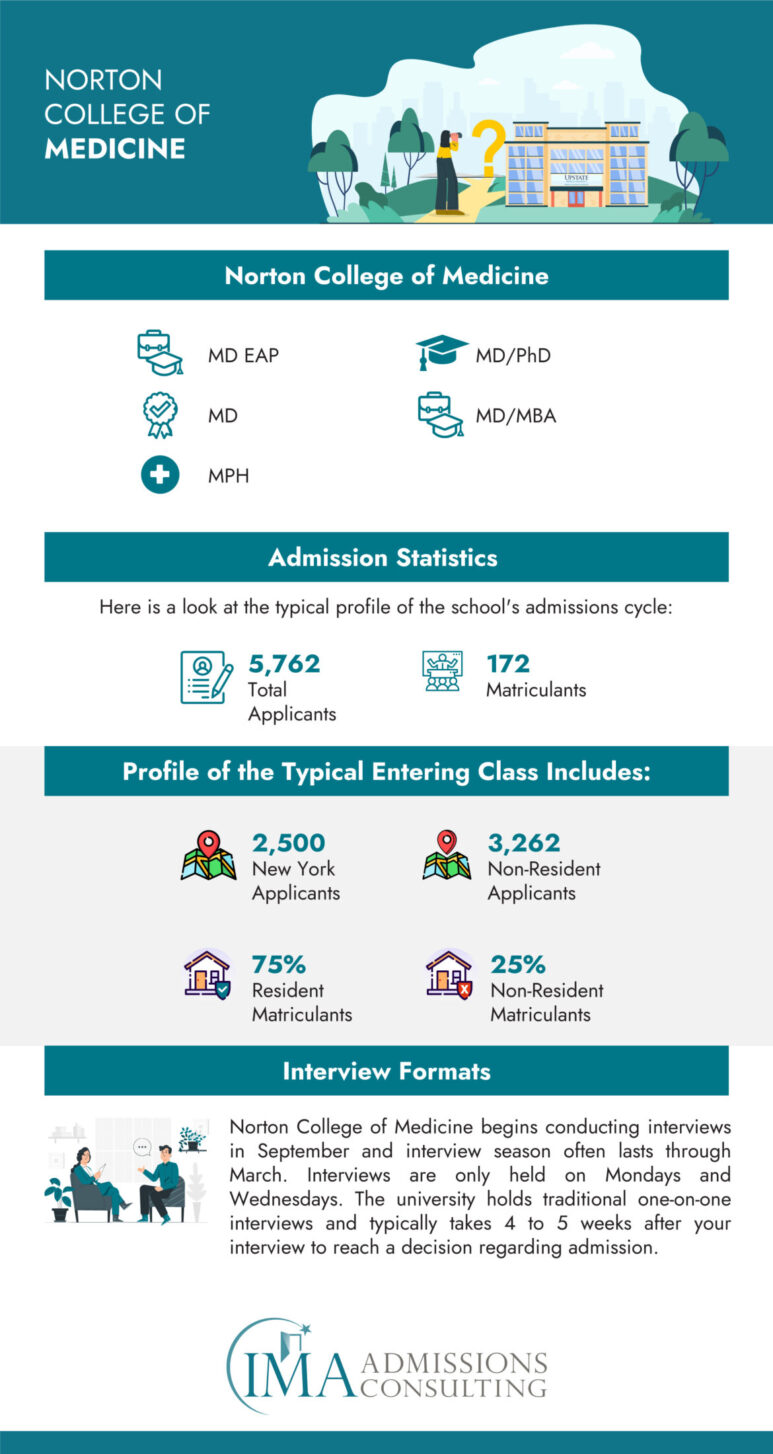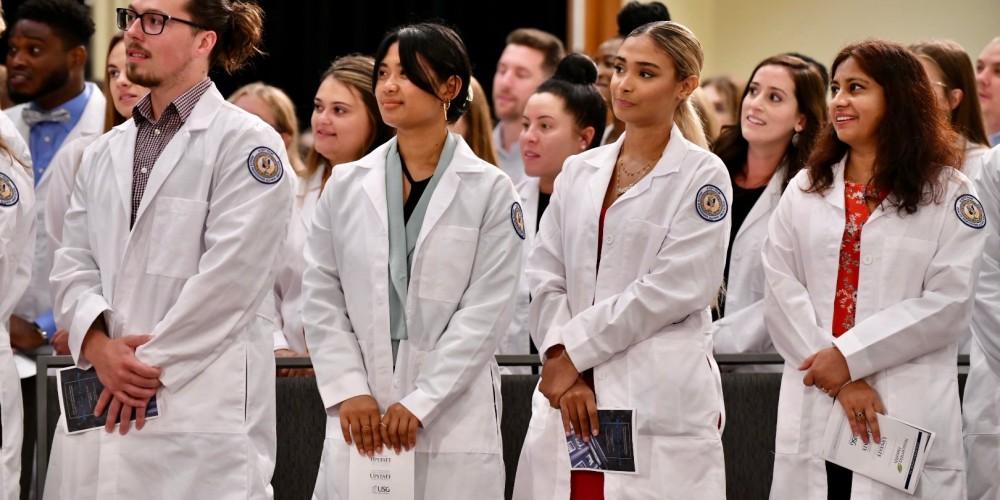The history of Norton College of Medicine at Upstate Medical University can be traced back to 1834 when Geneva Medical College was founded. Today, the Norton College of Medicine is dedicated to creating a vibrant and diverse learning environment. The college is dedicated to education, compassionate healthcare, and research.
Norton College of Medicine’s curriculum emphasizes the importance of social determinants of health and seeks to remove any educational content that perpetuates or promotes racial, ethnic, or other harmful stereotypes in the healthcare field.
Be an Informed Applicant
Norton Medical College has school-specific guidelines and requirements when it comes to their admissions and application process. To best tailor your application and ensure that you are putting your best foot forward and leaving a good impression on the admissions committee, it is crucial to understand these requirements.
This article covers:
- SUNY Upstate Medical University Rankings
- Medical Programs at Norton College of Medicine
- Selection Factors: What SUNY Upstate Medical University Looks for in an Applicant
- Academic Requirements
- SUNY Upstate Medical University Acceptance Rate, Class Profile, and More
- AMCAS Application and Norton College of Medicine Secondary Application
- Norton College of Medicine Secondary Application: Essay Prompts, Sample Answers, and Advice
- Medical School Admissions Consulting
- Voluntary Healthcare Internships
Personalized Help
At International Medical Aid, we understand that students often find themselves feeling overwhelmed by all that there is to do relating to the medical school application process. Universities have unique requirements and you must meet the requirements for each college you wish to apply to. To best help aspiring medical professionals navigate this process more easily, we recommend medical school admissions consulting.
Medical school admissions consultants are there to help students through every step of the process, or just one or two areas where they need additional guidance—whatever the case may be. Your consultant will offer helpful, constructive feedback on areas of improvement and help you submit the most competitive application possible.
Do you feel you could use some extra help and guidance? Consider enlisting the help of IMA’s personalized medical school admissions consulting service.
Why the SUNY Upstate Medical University?
Norton College of Medicine is constantly seeking to improve the way they teach healthcare education and to pave the way for a more inclusive and welcoming medical field. Each department of the university has a dedicated diversity and inclusion advocate.
The university’s mission statement is, “The mission of SUNY Upstate Medical University is to improve the health of the communities we serve through education, biomedical research, and patient care.”
Norton College of Medicine lists the school’s values as:
- Driving innovation and discovery
- Respecting people by treating everyone with dignity and grace
- Serving the community
- Valuing integrity through being open and honest
- Embracing diversity and inclusion
Norton College of Medicine Rankings
- #87 in Best Medical Schools: Research
- #94 in Best Medical Schools: Primary Care
- #50 Most Diverse Schools
- #67 Most Graduates Practicing in Medically Underserved Areas
- #92 Most Graduates Practicing in Primary Care Fields
- #48 Most Graduates Practicing in Rural Areas
Medical Programs at Norton College of Medicine
Students should thoroughly research all available medical programs at SUNY Upstate Medical University before applying. This research will further aid in focusing your application and guide your decision about which medical school is the best fit for you.
In this article, we will be going over the 5 degree options offered by Norton College of Medicine. SUNY Upstate Medical University does offer early assurance medical programs (EAPs). To apply for these early assurance medical programs, students must have completed 2 years of undergrad at an accredited college and currently be enrolled at an accredited institution.
Doctor of Medicine (MD)
The Norton College of Medicine MD program helps educate and prepare individuals for a rewarding career as a physician. The university can help prep you for a career in a variety of specialties from pediatrics to emergency medicine.
SUNY Upstate Medical University offers students a variety of amazing resources to help them receive the best education possible.
- An academic medical center that includes a level-1 trauma center, children’s hospital, biomedical research enterprise, and cancer center.
- A supportive environment and opportunities to learn alongside other students
- Special Medical Rural Scholars Program
- Opportunities for service learning
Other Degree Programs
MD/MBA – The MD/MBA program follows a 5-year timeline and requires students to attend SUNY Upstate Medical University and Syracuse University to receive their education. Your education will begin at Syracuse University and finish at Norton College of Medicine.
MPH – The Master of Public Health Program at Norton College of Medicine is fully accredited by the CEPH.
MD/PhD – This program combines the traditional teachings of an MD program with the teachings of a PhD program. The program typically takes 7 years to complete.
Selection Factors: What SUNY Upstate Medical University Looks for in an Applicant
When applying to medical schools, one of the most critical items you should research is the school’s selection criteria. Students should be well-informed about how their MCAT scores, GPA, and other work experiences stack up to those accepted by the college.
Admissions committees generally take a holistic approach to reviewing incoming applications. This means the committee reviews your application and attempts to get the big picture idea of who you are as a person, not just how well you scored on your MCAT exam which is why it is essential to have a well-rounded application. The majority of med schools follow the AAMC Core Competencies as a general guideline for application review.
Application Requirements for Norton College of Medicine
SUNY Upstate Medical University has specific application criteria and academic requirements that students must meet in order to be considered for acceptance.
MCAT and GPA Requirements
Norton College of Medicine does not have a minimum required GPA or MCAT score. Students who wish to apply to Norton College of Medicine should ensure their scores are comparable to the average GPA and MCAT score of recent entering classes.
The recent entering class had an average overall GPA of 3.67 and an average science GPA of 3.61. The class’s average MCAT score was 510.96.
Letters of Recommendation
All letters of recommendation must be submitted using the AMCAS Letters of Recommendation/Evaluation Service. Any letters sent directly to the college will not be read or considered.
Students should provide a letter from a Health Professions Advisory Committee or Pre-Health Advisor. In the absence of such advisors and/or committees, applicants can submit 2 LORs from faculty members in different departments (1 must be a science department faculty member).
Required Coursework for Norton College of Medicine
SUNY Upstate Medical University lists required courses as well as recommended courses. Recommended courses do not need to be completed but can give you a leg up when applying. The college also states that prerequisites do not have to be completed prior to submitting your application, but the classes must be completed before enrolling.
General Biology I and I With Labs
General Chemistry I and II With Labs
Organic Chemistry I With Lab
Biochemistry – Organic Chemistry II Will Not Meet the Biochemistry Prerequisite
General Physics I and II With Labs – Physics Class Does Not Have to Be Calculus-Based
Statistics – 3 Hours (Calculus Will Not Meet the Prerequisite)
English Elective – 3 Hours
English Composition or Writing Course – 3 Hours
Recommended Courses
Genetics
Cell Biology
Physiology
Social Sciences
Does SUNY Upstate Medical University Require the CASPer exam?
The CASPer test is not required by all colleges but is required by some. This exam is an online test designed to assess the various non-cognitive abilities of a candidate.
As of 2023, applicants are required to complete the CASPer exam as part of the Norton College of Medicine application process.
SUNY Medical School Acceptance Rate and Admission Statistics
The Norton College of Medicine has an overall acceptance rate of roughly 2.9%. Each entering class is around 170 students, with the college receiving over 5,500 applications each year.
Let’s go over the recent admission stats for Norton College of Medicine.
- 5,762 Total Applicants
- 172 Matriculants
- Average GPA of 3.67
- Average MCAT of 510.96

SUNY Upstate Medical University Tuition and Cost of Attendance
Students who wish to attend Norton Medical College need to budget for tuition and educational fees, but they also need to consider miscellaneous costs such as living expenses and incidentals. The following cost estimates have been provided by Norton College of Medicine.
Year 1:
- $45,213 Tuition and Fees
- $2,580 Books and Supplies
- $21,900 Living Expenses
- $1,735 Loan Fees
- $76,478 Resident Total / $97,968 Non-resident Total
Year 2:
- $44,853 Tuition and Fees
- $2,580 Books and Supplies
- $660 USMLE Step 1
- $21,900 Living Expenses
- $1,693 Loan Fees
- $73,786 Resident Total / $95,276 Non-resident Total
Year 3:
- $44,853 Tuition and Fees
- $2,400 Books and Supplies
- $660 USMLE Step 2
- $29,880 Living Expenses
- $1,951 Loan Fees
- $83,464 Resident Total / $104,954 Non-resident Total
Year 4:
- $44,953 Tuition and Fees
- $2,000 Books and Supplies
- $3,750 Residency Applications
- $29,880 Living Expenses
- $2,018 Loan Fees
- $85,121 Resident Total / $106,611 Non-resident Total
AMCAS Primary Application and SUNY Upstate Medical University Secondary Application
Most medical schools in the United States utilize the AMCAS application system. Your AMCAS is your primary application and will be sent to all of the medical schools you select. On average, you should expect it to take 4 to 6 weeks for a college to review your AMCAS application.
After the university has taken the time to review your primary application, they will send you an invitation to complete a secondary application. Secondary applications are unique to each medical school and generally contain essay prompts designed to help the admissions committee learn more about you, your values, ambitions, and motivations.
Please note that if you failed to meet any of the college’s admission criteria, such as minimum MCAT or GPA scores, prerequisites, or failure to include letters of recommendation, you will not be invited to fill out a secondary application.
For further clarification about the differences between the AMCAS primary application and a school-specific application, read this article.

SUNY Upstate Medical University Secondary Application: Essay Prompts, Sample Answers, and Advice
Secondary applications are a critical part of applying to med school. The essay prompts and questions included in the secondary application give you the chance to show the admissions committee why you are the best fit for their college and what makes you stand out. These are some helpful tips to keep in mind as you navigate secondary applications:
- Read all parts of essay prompts and questions carefully
- Supply concrete evidence from your academic, professional, or extracurricular experiences
- Do not repeat information you have already supplied in your AMCAS application
- Proofread your answers
- Write clearly and concisely
- For additional help consider utilizing our medical school admissions consulting service
The SUNY Upstate Medical University secondary application ranges from 1 to 5 essay prompts each year. The college asks questions that will allow the admissions committee to get to know each applicant better and on a more personal level.
Essay #1
Which medical specialty are you thinking about pursuing at this point? (Please note, answers have a 1500-character limit.)
If you have not considered or decided on a medical specialty, discuss what options you are weighing and why you feel these options may be the best fit for you.
Here is a sample answer:
After taking part in a pre-med shadowing study abroad program over the summer where I was able to shadow doctors in medically underserved areas, I feel confident in my choice to pursue Family Medicine/Primary Care in a rural New York area.
By pursuing a career in family medicine, I feel I will be able to help aid the largest amount of patients possible and make difference in the lives of those living in these rural areas.
Medical School Admissions Consulting
We attempt to provide the most thorough and accurate information possible for future physicians. Applying to and getting into medical school is a difficult process, and we understand how overwhelming the experience can be.
One of the best ways to ensure your application process goes smoothly and your application is as competitive as possible is by enlisting the professional help of IMA’s medical admissions consulting service.
Students who are interested in learning more about this service should schedule a consultation with IMA.
Voluntary Healthcare Internships
Our intense, patient-facing pre-med shadowing study abroad programs help students gain hands-on clinical experience. These internships take place in a variety of locations such as East Africa, South America, and the Caribbean. You will gain real-life experience as you shadow doctors and help the medically underserved. Not to mention that these internships help make your application for medical school competitive and help you stand out.
Good Luck!
We want to wish you the best of luck in your journey of applying to medical schools and your future career in medicine. The key to succeeding is taking your time, developing an application strategy, and seeking help when you need it.
If you feel you need additional personalized help, contact IMA and get guidance from one of our medical admission consultants.
Are you considering applying to other New York medical colleges or maybe you want to know how Norton College of Medicine stacks up to other colleges? Don’t forget to check out the other ultimate medical school guides on IMA’s website, especially if you’ve been asking yourself what are the best medical schools near me.
- Jacobs School of Medicine at the University at Buffalo
- Hofstra Zucker School of Medicine
- Weill Medical College of Cornell University
- University of Rochester Medical School
- Icahn School of Medicine at Mount Sinai
- Renaissance School of Medicine at Stony Brook University
- Albert Einstein College of Medicine
- Ohio University Heritage College of Osteopathic Medicine
- Northeast Ohio Medical University (NEOMED)
- University of Cincinnati College of Medicine
- University of Toledo College of Medicine
- Wright State University Boonshoft School of Medicine
- Ohio State University College of Medicine
- Rowan University School of Osteopathic Medicine
- Hackensack Meridian School of Medicine (HMSOM)
- Rutgers New Jersey Medical School (NJMS)
- Rutgers Robert Wood Johnson Medical School
- Cooper Medical School of Rowan University (CMSRU)
- A.T. Still University Kirksville College of Osteopathic Medicine
- Saint Louis University School of Medicine
- University of Missouri Medical School
- Kansas City University (KCU)
- UMKC School of Medicine
- New York Medical College
- University of Pittsburgh School of Medicine
- University of Wisconsin Medical School
- VCU School of Medicine
- University of Maryland School of Medicine
- Case Western Medical School
- University of North Carolina Medical School
- University of Florida Medical School
- Emory University School of Medicine
- Boston University College of Medicine
- California University of Science and Medicine
- UC San Diego Medical School
- California Northstate University College of Medicine
- Touro University of California
- CHSU College of Osteopathic Medicine
- UC Davis School of Medicine
- Harvard Medical School
- UC Riverside School of Medicine
- USC Keck School of Medicine
- UT Southwestern Medical School
- Long School of Medicine at UT Health San Antonio
- University of the Incarnate Word School of Osteopathic Medicine
- UT Austin’s Dell Medical School
- UTMB School of Medicine
- McGovern Medical School at UT Health
- Johns Hopkins School of Medicine
- McGovern Medical School at UT Health
- The University of Texas Rio Grande Valley School of Medicine
- UNT Texas College of Osteopathic Medicine
- University of Houston College of Medicine
- Texas A&M College of Medicine
- Johns Hopkins Medical School
- Baylor College of Medicine
- George Washington University School of Medicine
- Vanderbilt University School of Medicine
- St. George’s University School of Medicine
- Lake Erie College of Osteopathic Medicine (in Pennsylvania)
- Sidney Kimmel Medical College at Thomas Jefferson University
- Wake Forest University School of Medicine
- Western University of Health Sciences (in California)
- Drexel University College of Medicine
- Stritch School of Medicine at Loyola University Chicago
- Georgetown University School of Medicine
- Yale School of Medicine
- Perelman School of Medicine
- UCLA Medical School
- NYU Medical School
- Washington University School of Medicine
- Brown Medical School














